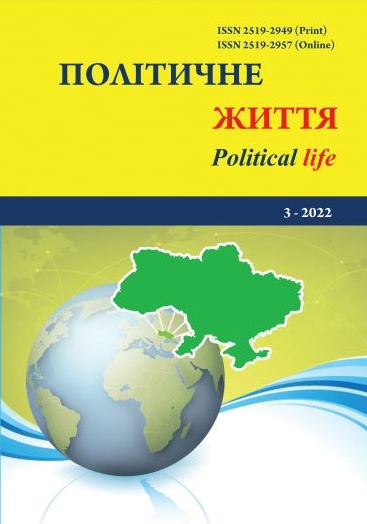Поліційне подолання громадських безпорядків, спричинених пандемією, у Болгарії
DOI:
https://doi.org/10.31558/2519-2949.2022.3.7Ключові слова:
Болгарія; поліція; пандемія; громадянські заворушення; протестиАнотація
Пандемія коронавірусу та численні обмеження, запроваджені урядом, сприяли виникненню численних зборів та акцій протесту. Громадяни висловлювали невдоволення обмеженням їхніх прав і свобод, водночас вимагаючи вирішення проблем, які мали місце до початку пандемії. У Болгарії серед основних проблем виділялись корупція, невдоволення діями уряду та недотримання незалежності судової системи. З цієї причини з 9 липня 2020 року до 16 квітня 2021 року відбувалися акції протесту громадян, які вимагали, зокрема, змін та відставки уряду. Аналіз надає відповіді на два запитання дослідження: які дії здійснювали протестувальники в період з липня 2020 року по квітень 2021 року? Як силовики боролися з громадськими заворушеннями під час протестів? Основна проблема дослідження стосується впливу репресій на мобілізацію або демобілізацію протестувальників та застосування насильницьких дій протестувальниками. Деталізація аналізу вказаних дій дозволила розрізнити насильницькі та мирні дії. У свою чергу, оцінюючи дії спецслужб, дослідження розмежовує репресивні та нерепресивні дії поліції. У цьому дослідженні використовується метод якісного аналізу джерел. Він спирається на методику контент-аналізу саме медіа-висвітлення діяльності міліції та учасників протестів у вказаний період. Аналіз ґрунтується на повідомленнях, які з’явилися на найважливіших сайтах та інтернетпорталах, які повідомляють про хід протестів. За результатами аналізу встановлено, що основні вимоги та цілі залишилися незмінними, а дії мітингувальників включали багато видів як насильницької, так і мирної діяльності. З боку органів охорони правопорядку також було зроблено поділ на репресивну та нерепресивну діяльність. Протести закономірно закінчилися із закінченням повноважень уряду. Репресії не вплинули на масштаби мобілізації протестувальників і викликали бурхливі протести.
Посилання
Rezmer-Płotka K. The Effects of Crises in the European Union as a Manifestation of the Militant Democracy Rule Implementation, Przegląd Prawa Konstytucyjnego, 2020, 6(58): 615–621. https://doi.org/10.15804/ppk.2020.06.50.
Rak J. and Bäcker R. (Eds.), Neo-militant Democracies in the Post-communist Member States of the European Union, 2022, London and New York: Routledge.
Loewenstein K. Militant Democracy and Fundamental Rights I, The American Political Science Review, 1937a, 3(31): 417–432; Loewenstein K. Militant Democracy and Fundamental Rights II, The American Political Science Review, 1937b, 4(31): 638–658.
Marszałek-Kawa J., The Institutional Position and Functions of the Sejm of the Republic of Poland after the Accession to the European Union, 2019, Odessa: Helvetica Publishing House.
Bäcker R., Rak J., Trajektoria trwania opancerzonych demokracji, Studia nad Autorytaryzmem i Totalitaryzmem, 2019, 41(3): 63–82.
Skrzypek M., The Banning of Extremist Political Parties as a Measures of Neo-Militant Democracy: The Experience of Post-Communist States, HAPSc Policy Briefs Series 2020, 1(2): 67–73. https://doi.org/10.12681/hapscpbs.26450.
Rak J. and Bäcker R., Editorial. Facing Zeitgeist: The World between Neo- and Quasi-militant Democracy, Polish Political Science Yearbook, 2021, 50(2): 5–8.
Rak J., Conceptualizing the Theoretical Category of Neo-militant Democracy: The Case of Hungary.” Polish Political Science Yearbook, 2020, 49(2): 61–70. https://doi.org/10.15804/ppsy2020204.
Rezmer-Płotka K., Contentious Politics in Defense of Neo-Militant Democracy in Poland: The Rationale Behind Fighting a Quasi-Militant Democracy, HAPSc Policy Briefs Series 2021, 2(1): 24–29. https://doi.org/10.12681/hapscpbs.27652.
Osiewicz P.,Limitations to the Right to Freedom of Assembly in Poland during the COVID-19 Pandemic: The Case of Women’s Strike, HAPSc Policy Briefs Series 2020, 1(2): 195–200. https://doi.org/10.12681/hapscpbs.26458.
Rezmer-Płotka K., Policy on Public Assemblies in Times of Crisis: Recommendations Concerning the Strategy of Militant Democracy, HAPSc Policy Briefs Series, 2020, 1(2): 201–207. https://doi.org/10.12681/hapscpbs.26459.
World Data, Corruption in Bulgaria URL: https://www.worlddata.info/europe/bulgaria/corruption.php.
Transparency International, Corruption PerceptionsIndex, URL: https://www.transparency.org/en/cpi/2019/index/nzl.
European Commission, The Corruption Perception Index 2019: The EU is the best performer in the world, URL: https://ec.europa.eu/regional_policy/en/newsroom/news/2020/01/27-01-2020-the-corruption-perception-index2019-the-eu-is-the-best-performer-in-the-world.
Brennan O’ John, URL: Bulgarians under the Yoke of Oligarchy. https://www.maynoothuniversity.ie/sites /default/files/assets/document/New_Left_Review_Bulgarians_under_the_Yoke_of_Oligarchy.pdf
Krasteva A, URL: Balgarskiyat populizam – shtrihi kam portreta. https://annakrasteva.wordpress.com/2013/ 12/23/bulgraian-populism/.
Brennan O’ John, URL: Bulgarians under the Yoke of Oligarchy. https://www.maynoothuniversity.ie/sites/ default/files/assets/document/New_Left_Review_Bulgarians_under_the_Yoke_of_Oligarchy.pdf
Antonov, S., The Age of the Oligarchs: How a group of political and economic magnates have taken control of Bulgaria, URL: https://reutersinstitute.politics.ox.ac.uk/sites/default/files/research/files/ The%2520Age%2520of%2520Oligarchs.pdf.
Antonov, S., The Age of the Oligarchs: How a group of political and economic magnates have taken control of Bulgaria, URL: https://reutersinstitute.politics.ox.ac.uk/sites/default/files/research/files/ The%2520Age%2520of%2520Oligarchs.pdf.
Earl J., Repression and social movements, [in:] The Wiley-Blackwell Encyclopedia of Social and Political Movements, [Eds.] David A. Snow, Donatella della Porta, Bert Klandermans, and Doug McAdam, 2013, Blackwell Publishing Ltd.
Ellefsen R., The Unintended Consequences of Escalated Repression, Mobilization – An International Quarterly, 2021, 26(1): 87-108.
Rak J., Repression and Blockupy Radicalization in Austerity-Driven Germany, Przegląd Zachodni, 2020, No. 2, p. 189-203.
Nassauer A., Effective crowd policing: empirical insights on avoiding protest violence, Policing: An International Journal of Police Strategies & Management, 38(1): 132-152.
Mix T., Lethal Repression of Peaceful Protest in Africa. Why Do (non-) Accountable and Military Regimes Shoot, Student Paper Series 15, 2014, URL: https://www.ibei.org/ibei_studentpaper15_71932.pdf.
Göbel C., The Political Logic of Protest Repression in China, Journal of Contemporary China, 30(128), p. 169-185.
Council of Europe. Bulgaria. Code of Ethics for Officials of the Ministry of the Interior with Police Functions. URL: https://policehumanrightsresources.org/content/uploads/2016/08/Code-Of-Ethics-For-Officials-OfThe-Ministry-Of-The-Interior-With-Police-Functions-2004.pdf?x19059.
Passavant A. P., Policing Protest, Duke University Press, Durham and London, 2021.
Davenport C., State Repression and Political Order, The Annual Review of Political Science, 2007, 10(1), s. 1–23.
Tarrow S., Strangers at the Gates. Movements and States in Contentious Politics, Cambridge University Press 2012.

